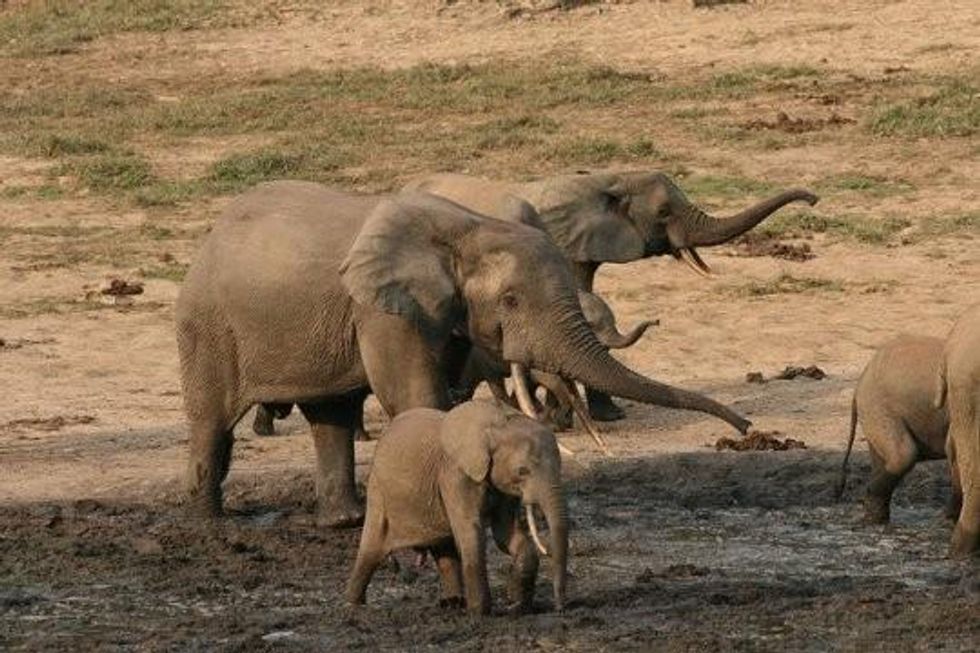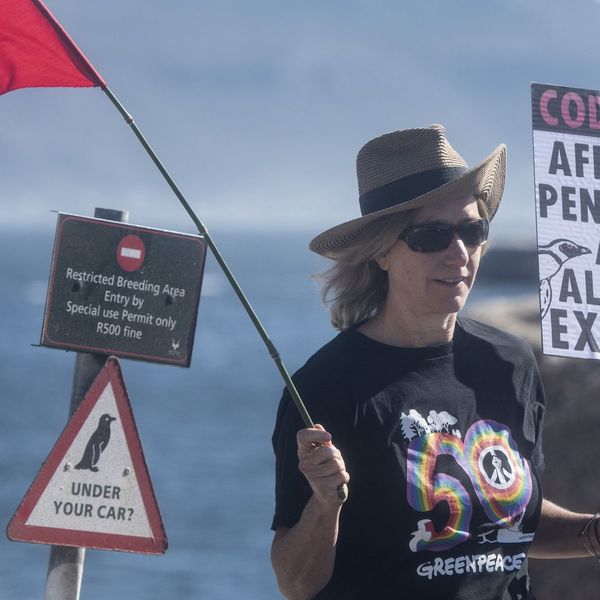Study: Africa's Elephants in 'Devastating Decline'
The forest elephants of central Africa are suffering a "widespread and catastrophic decline," according to a study published Monday in the online journal PLOS ONE.

The study's authors write that the elephant population plummeted by 62% between 2002-2011, during which time they lost 30% of their range.
Industrial agriculture takeover of land, such as the palm oil industry, is threatening the forest elephants' habitat. But it is the poaching as part of the illegal ivory trade that is fueling their decline, the report states.
Conservation group Environmental Investigation Agency (EIA) charged on Monday that web giant Google is fostering the illicit trade of the poached ivory through advertisements from its Japanese Shopping site, saying that it has about 10,000 ads promoting ivory products, as well as ads promoting whale products.
"Google has laudable policies that prohibit the promotion of endangered wildlife products including whale, dolphin and elephant ivory, but sadly these are not being enforced and that's devastating for whales and elephants," EIA President Allan Thornton said in a statement.
"While elephants are being mass slaughtered across Africa to produce ivory trinkets, it is shocking to discover that Google, with the massive resources it has at its disposal, is failing to enforce its own policies designed to help protect endangered elephants and whales," stated Thornton.
__________________________________
An Urgent Message From Our Co-Founder
Dear Common Dreams reader, The U.S. is on a fast track to authoritarianism like nothing I've ever seen. Meanwhile, corporate news outlets are utterly capitulating to Trump, twisting their coverage to avoid drawing his ire while lining up to stuff cash in his pockets. That's why I believe that Common Dreams is doing the best and most consequential reporting that we've ever done. Our small but mighty team is a progressive reporting powerhouse, covering the news every day that the corporate media never will. Our mission has always been simple: To inform. To inspire. And to ignite change for the common good. Now here's the key piece that I want all our readers to understand: None of this would be possible without your financial support. That's not just some fundraising cliche. It's the absolute and literal truth. We don't accept corporate advertising and never will. We don't have a paywall because we don't think people should be blocked from critical news based on their ability to pay. Everything we do is funded by the donations of readers like you. Will you donate now to help power the nonprofit, independent reporting of Common Dreams? Thank you for being a vital member of our community. Together, we can keep independent journalism alive when it’s needed most. - Craig Brown, Co-founder |

The study's authors write that the elephant population plummeted by 62% between 2002-2011, during which time they lost 30% of their range.
Industrial agriculture takeover of land, such as the palm oil industry, is threatening the forest elephants' habitat. But it is the poaching as part of the illegal ivory trade that is fueling their decline, the report states.
Conservation group Environmental Investigation Agency (EIA) charged on Monday that web giant Google is fostering the illicit trade of the poached ivory through advertisements from its Japanese Shopping site, saying that it has about 10,000 ads promoting ivory products, as well as ads promoting whale products.
"Google has laudable policies that prohibit the promotion of endangered wildlife products including whale, dolphin and elephant ivory, but sadly these are not being enforced and that's devastating for whales and elephants," EIA President Allan Thornton said in a statement.
"While elephants are being mass slaughtered across Africa to produce ivory trinkets, it is shocking to discover that Google, with the massive resources it has at its disposal, is failing to enforce its own policies designed to help protect endangered elephants and whales," stated Thornton.
__________________________________

The study's authors write that the elephant population plummeted by 62% between 2002-2011, during which time they lost 30% of their range.
Industrial agriculture takeover of land, such as the palm oil industry, is threatening the forest elephants' habitat. But it is the poaching as part of the illegal ivory trade that is fueling their decline, the report states.
Conservation group Environmental Investigation Agency (EIA) charged on Monday that web giant Google is fostering the illicit trade of the poached ivory through advertisements from its Japanese Shopping site, saying that it has about 10,000 ads promoting ivory products, as well as ads promoting whale products.
"Google has laudable policies that prohibit the promotion of endangered wildlife products including whale, dolphin and elephant ivory, but sadly these are not being enforced and that's devastating for whales and elephants," EIA President Allan Thornton said in a statement.
"While elephants are being mass slaughtered across Africa to produce ivory trinkets, it is shocking to discover that Google, with the massive resources it has at its disposal, is failing to enforce its own policies designed to help protect endangered elephants and whales," stated Thornton.
__________________________________

